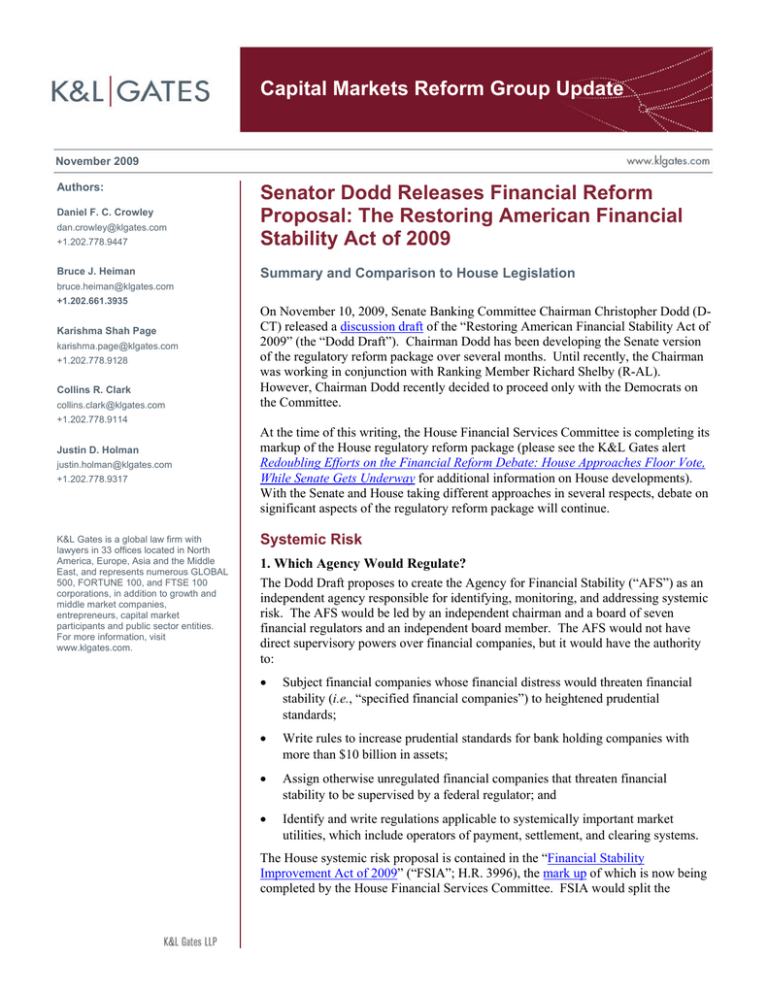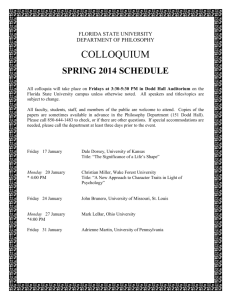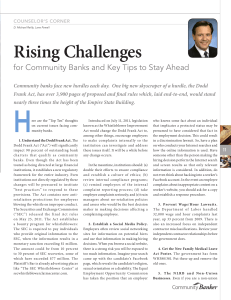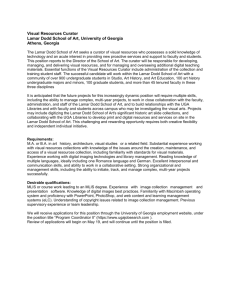
Capital Markets Reform Group Update
November 2009
Authors:
+1.202.778.9447
Senator Dodd Releases Financial Reform
Proposal: The Restoring American Financial
Stability Act of 2009
Bruce J. Heiman
Summary and Comparison to House Legislation
Daniel F. C. Crowley
dan.crowley@klgates.com
bruce.heiman@klgates.com
+1.202.661.3935
Karishma Shah Page
karishma.page@klgates.com
+1.202.778.9128
Collins R. Clark
collins.clark@klgates.com
On November 10, 2009, Senate Banking Committee Chairman Christopher Dodd (DCT) released a discussion draft of the “Restoring American Financial Stability Act of
2009” (the “Dodd Draft”). Chairman Dodd has been developing the Senate version
of the regulatory reform package over several months. Until recently, the Chairman
was working in conjunction with Ranking Member Richard Shelby (R-AL).
However, Chairman Dodd recently decided to proceed only with the Democrats on
the Committee.
+1.202.778.9114
Justin D. Holman
justin.holman@klgates.com
+1.202.778.9317
K&L Gates is a global law firm with
lawyers in 33 offices located in North
America, Europe, Asia and the Middle
East, and represents numerous GLOBAL
500, FORTUNE 100, and FTSE 100
corporations, in addition to growth and
middle market companies,
entrepreneurs, capital market
participants and public sector entities.
For more information, visit
www.klgates.com.
At the time of this writing, the House Financial Services Committee is completing its
markup of the House regulatory reform package (please see the K&L Gates alert
Redoubling Efforts on the Financial Reform Debate: House Approaches Floor Vote,
While Senate Gets Underway for additional information on House developments).
With the Senate and House taking different approaches in several respects, debate on
significant aspects of the regulatory reform package will continue.
Systemic Risk
1. Which Agency Would Regulate?
The Dodd Draft proposes to create the Agency for Financial Stability (“AFS”) as an
independent agency responsible for identifying, monitoring, and addressing systemic
risk. The AFS would be led by an independent chairman and a board of seven
financial regulators and an independent board member. The AFS would not have
direct supervisory powers over financial companies, but it would have the authority
to:
•
Subject financial companies whose financial distress would threaten financial
stability (i.e., “specified financial companies”) to heightened prudential
standards;
•
Write rules to increase prudential standards for bank holding companies with
more than $10 billion in assets;
•
Assign otherwise unregulated financial companies that threaten financial
stability to be supervised by a federal regulator; and
•
Identify and write regulations applicable to systemically important market
utilities, which include operators of payment, settlement, and clearing systems.
The House systemic risk proposal is contained in the “Financial Stability
Improvement Act of 2009” (“FSIA”; H.R. 3996), the mark up of which is now being
completed by the House Financial Services Committee. FSIA would split the
Capital Markets Reform Group Update
functions of a systemic risk regulator among the
Federal Reserve and a new entity called the
Financial Services Oversight Council (“FSOC”),
which would be a council of regulators chaired by
the Secretary of the Treasury.
deemed systemically important. The Federal
Reserve would not have to identify the recipients of
such assistance for up to 1 year after the assistance
is given. FSIA has no such provision.
Consolidation of Bank Regulation
2. Is the Government Able to Appoint a
Receiver for Financial Firms?
The Dodd Draft also would:
•
Authorize the Secretary of the Treasury, upon
the recommendation of the Financial Institution
Regulatory Administration (“FIRA”; described
in further detail below) and either the Federal
Deposit Insurance Corporation (“FDIC”) or the
Securities and Exchange Commission (“SEC”),
to appoint the FDIC as a receiver;
•
Authorize the FDIC, as receiver, to sell some or
all of a financial company’s assets, lend to a
financial company, guarantee a financial
company’s assets, or acquire an equity interest
in the financial company;
•
•
Create a resolution fund for financial companies,
funded by post-resolution assessments imposed
on financial companies with more than $10
billion in total assets; and
Authorize the Board of Governors of the Federal
Reserve System (“Federal Reserve”) to give
systemically important market utilities discount
and borrowing privileges as if they were
depository institutions.
FSIA is similar, but some pending amendments
would restrict the types of assistance that the FDIC
could give to a financial company when acting as
receiver. House Financial Services Committee
(“HFSC”) Chairman Barney Frank (D-MA) is
expected to amend the House version so that a fund
for resolving financial companies would be created
in advance, rather than recovering the costs after a
company fails. Finally, the House version would not
give systemically important market utilities Federal
Reserve discount and borrowing privileges.
3. Other Features
The Dodd Draft would also limit the Federal
Reserve’s lender-of-last-resort authority so that it
can lend only to facilities “with broad-based
participation” or to market utilities that the AFS has
The Dodd Draft proposes to consolidate all federal
bank supervisory powers into FIRA. The Office of
the Comptroller of the Currency (“OCC”) and the
Office of Thrift Supervision (“OTS”) would be
merged into the FIRA. A division within FIRA
would regulate community banks. The FDIC and
Federal Reserve would continue to exist, but they
would lose their supervisory powers over state
banks. The FIRA would be headed by an
independent chairperson and a board consisting of
the heads of the FDIC and Federal Reserve and two
independent members.
In addition, the Dodd Draft would eliminate the
thrift charter, but it would do so by attrition. No
additional thrift charters could be issued, and
section 5 of the Home Owners’ Loan Act would be
repealed when the last thrift charter ceases to exist.
The House bank regulation consolidation proposal
is also contained in FSIA. The House proposal has
more modest goals for consolidation. FSIA would
only dissolve the OTS, transferring its bank
supervisory powers to a division within the OCC
and transferring its holding company supervisory
powers to the Federal Reserve. FSIA would not
phase out new thrift charters; instead, the OCC
would have the authority to make issuances.
Bank Holding Companies
The Dodd Draft would transfer the Federal
Reserve’s power to supervise bank holding
companies to the FIRA. It would also impose a
three-year moratorium on insuring the deposits of or
authorizing the change of control of certain nonbank banks, i.e., industrial loan companies, credit
card banks, and trust companies. During the
moratorium, a study would be conducted on
whether to eliminate the corresponding exceptions
to the Bank Holding Company Act.
FSIA would repeal the current exceptions to the
Bank Holding Company Act for industrial loan
companies (ILCs) and credit card banks going
November 2009
2
Capital Markets Reform Group Update
forward, and “sunset” the existing institutions.
Unlike the Dodd Draft, the House version would
also require that current ILCs create an intermediary
“section 6” holding company, and there would be
significant limits on transactions between the
holding company and affiliates. The House version,
as amended, retains the exception to the Bank
Holding Company Act for credit card banks.
Consumer Financial Protection
Agency
The Dodd Draft proposes to create a Consumer
Financial Protection Agency (“CFPA”), similar to
the House legislation, the “Consumer Financial
Protection Act” (H.R. 3126), which was reported
favorably by the HFSC on October 22 and the House
Energy and Commerce Committee on October 29.
The CFPA would have significant authority over
rule-writing, supervision, and enforcement for
consumer protection. For additional information on
the House legislation, please see the recent K&L
Gates Alert Analysis of Consumer Financial
Protection Agency Legislation: Top Ten Issues.
Similar to the House legislation, the Dodd Draft
would roll back federal preemption of state laws,
allowing states to enact more stringent consumer
protections than those in place under federal law.
This remains a significant area of controversy in the
House, and will likely continue to be so in the
Senate.
Another area of remaining controversy is the
structure of the CFPA. In the bill reported by the
House Financial Services Committee, the CFPA
would be headed by an independent director. In the
bill subsequently reported by the House Energy and
Commerce Committee, the CFPA would be led by a
five-member board; HFSC Chairman Frank has
stated that such an approach would “weaken the
capacity of the agency to provide consumer
protection.” The Dodd Draft, however, takes the
five-member board approach.
Private Funds
The Dodd Draft would require registration of
investment advisers to hedge funds with the SEC.
The Dodd Draft exempts from SEC registration
advisers to private equity funds, subject to SEC
definition of the term. In addition, the Dodd Draft
excludes family offices from the definition of
“investment adviser,” raises the federal investment
adviser registration threshold to $100 million,
requires investment advisers to use an independent
custodian to hold client assets, and defines “private
fund” as an issuer rather than an investment fund.
The House version, the “Private Fund Investment
Advisers Registration Act” (H.R. 3818), has several
key differences, which include:
•
An exemption for private fund advisers who
manage assets under $150 million;
•
A requirement that advisers to family offices
register with the SEC;
•
No change in the asset threshold for SEC
registration;
•
An exemption from registration for Small
Business Investment Companies; and
•
Defining “private fund” as an investment fund.
For more information, see K&L Gates' Global
Financial Market Watch Blog posting Private Funds
and Broker-Dealers Under Dodd's Restoring
American Financial Stability Act and the next issue
of the K&L Gates Private Equity Newsletter.
Derivatives
The relevant provisions of the Dodd Draft are
similar to the House version, the “Over-the-Counter
Derivatives Markets Act” (H.R. 3795), except for
two key differences (the House Agriculture
Committee favorably reported its own version of the
legislation on October 21—as a result of some
differences, the Rules Committee will likely issue a
rule seeking to reconcile the areas of difference).
One difference is that, in the Senate bill, the SEC
and Commodity Futures Trading Commission
(“CFTC”) would be required to pre-approve
contracts before clearinghouses can clear them.
This has been controversial because in the House
legislation there is no requirement that the SEC or
CFTC decide, rather it is up to the clearinghouse.
On November 3, 2009, HFSC Chairman Frank
wrote a letter to CFTC Chairman Gary Gensler
seeking assistance in drafting language that would
give the CFTC and the SEC the authority to make
the initial decision rather than the clearinghouse.
Chairman Gensler, however, believes the
November 2009
3
Capital Markets Reform Group Update
clearinghouses should have the first say, not federal
regulators. The initial decider is important because
there is a potential conflict of interest because
derivatives dealers have a stake in some
clearinghouses and may not push for a swap to be
cleared.
The other key difference is that in the Dodd Draft, if
the SEC and CFTC are unable to establish joint
rules, then the AFS would make the decision. In the
House version, the decision would be made by the
Secretary of the Treasury. The House version also
gives the SEC and the CFTC the authority to ban
access to the U.S. financial system if it is determined
that an entity in a foreign country poses a risk to the
U.S. system, prohibits government assistance from
being given to a clearinghouse, and gives the SEC
and CFTC authority to ban abusive swaps.
Investor Protection
The Dodd Draft makes a number of additional
reforms aimed at investor protection, including:
•
Creating an Office of the Investor Advocate
within the SEC, which would analyze the impact
of SEC actions on investors, recommend
changes to statutes and regulations, and assist
investors in their interactions with the SEC;
•
Requiring securitizers to retain at least 10
percent of the credit risk for any asset that is
bundled into an asset-backed security; and
•
Authorizing the SEC to fund itself through
industry assessments, freeing it from
dependence on the Congressional appropriations
process.
asset that is bundled into an asset-backed
security; and
•
Increase the funding that could be appropriated
to the SEC, but not authorize the SEC to fund
itself through industry assessments.
Both the Dodd Draft and the House version would:
•
Authorize the SEC to restrict or prohibit predispute arbitration agreements;
•
Provide for monetary awards to whistleblowers
and prohibitions against employer retaliation;
and
•
Extend liability for aiding and abetting “to the
same extent as the person to whom such
assistance is provided.”
Broker-Dealers
The Dodd Draft would remove the exemption
applicable to broker-dealers from the Investment
Advisers Act of 1940 (“Advisers Act”), meaning
that broker-dealers would be considered investment
advisers to the extent that they give investment
advice, even if only incidental to their brokerage
activities. The House’s approach, contained in the
IPA, is distinct, keeping the exemption to the
Advisers Act while imposing a fiduciary duty on
broker-dealers “no less stringent” than the one
applicable to investment advisers under the
Advisers Act.
The House versions of these provisions are
contained in both the Investor Protection Act of
2009 (“IPA”; H.R. 3817) and FSIA. The House
versions differ in that they would:
The Dodd Draft also would subject broker-dealers
to auditing requirements that currently apply to
security issuers under the Sarbanes-Oxley Act. The
House version has no such provision. For more
information, see K&L Gates' Global Financial
Market Watch Blog posting Private Funds and
Broker-Dealers Under Dodd's Restoring American
Financial Stability Act.
•
Credit Ratings Agencies
•
Create an Investment Advisory Committee
authorized only to “advise and consult with” the
SEC, which is notably less power than the Dodd
Draft would give to the Office of the Investor
Advocate;
Require securitizers to retain at least 5 percent,
rather than 10 percent, of the credit risk for any
The Dodd Draft proposes to enhance oversight of
credit rating agencies by establishing a new Office
of Credit Rating Agencies, housed within the SEC.
The Dodd Draft would require Nationally
Recognized Statistical Ratings Organizations
(“NRSROs”) to: (1) establish internal controls over
processes for determining credit ratings; (2) separate
ratings from sales and marketing activities; (3)
November 2009
4
Capital Markets Reform Group Update
disclose their methodologies, their use of third
parties for due diligence efforts, and their ratings
track record; and (4) consider credible information
from sources other than the issuer. The SEC would
be required to examine NRSROs once a year and
will have the authority to fine and deregister
agencies. In addition, investors could bring private
rights of action against ratings agencies under facts
giving rise to a strong inference of a knowing or
reckless failure to investigate or to obtain analysis
from an independent source.
The House version, contained in the “Accountability
and Transparency in Rating Agencies Act” (H.R.
3890), was reported favorably by the HFSC on
October 28. The legislation also calls for
establishing an office to administer the SEC’s
enhanced authorities with respect to practices of
NRSROs. The legislation also includes provisions,
albeit slightly different from the Senate approach,
aimed at enhanced internal controls, mitigation of
conflicts of interest, and disclosure. The House
version also provides a private right of action,
allowing investors to sue agencies that “knowingly
or recklessly” fail to review key information in their
ratings.
Insurance
The Dodd Draft would create an Office of National
Insurance (“ONI”) within the Treasury Department.
The ONI would be authorized to monitor the
insurance industry and make recommendations to
the AFS about possible sources of systemic risk.
The ONI would be required to study ways to
modernize insurance regulation and provide
Congress with recommendations, due within 18
months of the enactment of the legislation. The
Dodd Draft would provide limited preemption
authority in instances when a state treats foreign
insurers subject to an international insurance
agreement less favorably than domestic insurers and
would provide the Treasury Secretary with the
authority to negotiate and enter into international
insurance agreements.
The Dodd Draft also contains several state-based
reforms which, among other items, include:
•
With respect to nonadmitted insurance,
providing that the home state of the insured has
exclusive authority to regulate and require any
premium tax payment;
•
Imposing uniform standards for surplus lines
eligibility; and
•
Providing requirements for the regulation of
credit and solvency for reinsurance.
The HFSC is considering similar legislation, the
Federal Insurance Office Act (H.R. 2609), which is
expected to be marked up following the
Thanksgiving recess. Similar to the Dodd Draft, the
Federal Insurance Office would monitor the
insurance industry, including in the area of systemic
risk, and coordinate international insurance issues.
The House bill does not contain the state-based
reforms contained in the Dodd Draft.
Municipal Securities
The Dodd Draft takes a holistic approach to
changing the municipal securities regulatory regime.
The changes in the Dodd Draft include:
•
Requiring that the Municipal Securities
Rulemaking Board (“MSRB”) establish rules
for financial advisers, swap advisers and
investment brokers;
•
Giving investor and public representatives a
majority on the MSRB;
•
Requiring the MSRB to serve as a repository of
information from municipal market participants
required by FIRA;
•
Dividing equally between the SEC and the
MSRB fines collected by the SEC or its
designee for violations of the rules; and
•
Requiring the Registered Securities Association
(“RSA”) to request guidance from the MSRB
and provide information to the MSRB about
enforcement actions and examinations of the
RSA.
The House legislation is more limited in its impact
on municipal securities. It does not call for changes
with the respect to the MSRB. The House’s IPA,
however, included an amendment offered by
Congressman Steve Driehaus (D-OH) that would
require the registration of municipal financial
advisers. Other key provisions of the Driehaus
amendment include:
November 2009
5
Capital Markets Reform Group Update
•
Exempting employees of municipal financial
advisers from registration with the SEC if the
adviser is registered and not a natural person;
Directors in uncontested elections to receive a
majority of votes in order to be elected (similar
to S. 1074);
•
Prohibiting violations of rules and regulations
the SEC establishes regarding conflicts of
interest and fair practices (including but not
limited to political contributions);
Disclosure if the positions of chairperson and
CEO are the same individual (S. 1074 would
prohibit the same person from serving in both
positions); and
•
Shareholder ratification of staggered terms of
directors (S. 1074 would have prohibited
staggered terms).
•
Giving the SEC the power to exempt specific
advisers or classes of advisers from registration;
•
•
•
•
Establishing a fiduciary duty to any municipal
securities issuer for whom a municipal financial
adviser acts as an adviser; and
Defining municipal financial adviser as a person
who provides advice to a municipal securities
issuer for compensation, including those who
prepare disclosure documents (attorneys are
excluded), assist in selecting or negotiating
guaranteed investment contracts or other
investment products, and assist the issuer in a
primary offering that is not a public offering.
Executive Compensation and
Corporate Governance
The Dodd Draft contains a number of executive
compensation and corporate governance provisions,
balancing the approach taken by the House-passed
“Corporate and Financial Institution Compensation
Fairness Act of 2009” (H.R. 3269) and Senator
Schumer’s “Shareholder Bill of Rights Act of 2009”
(S. 1074). The Dodd Draft would require:
•
Shareholders of public companies to have a nonbinding vote on executive pay and golden
parachutes (similar to provisions in H.R. 3269
and S. 1074);
•
Public companies to set clawback policies for
inaccurate financial statements;
•
Public companies to have independent
compensation committees (similar to H.R.
3269);
•
The SEC to promulgate regulations providing
shareholder proxy access to nominate directors
(similar to S. 1074);
Looking Ahead
The Senate Banking Committee is expected to begin
substantive markup of the Dodd Draft after the
Thanksgiving recess, working through much of
December. However, in light of competing
priorities, Senate floor action is not likely to occur
until January 2010 at the earliest.
The HFSC is expected to complete its markup of the
regulatory reform legislation, which was considered
as several separate bills, by November 20. Full
House consideration is likely in December.
Please see previous K&L Gates updates, including
Redoubling Efforts on the Financial Reform
Debate: House Approaches Floor Vote, While
Senate Gets Underway and Congress Builds on
Obama Financial Regulatory Reform Approach, as
Reform Efforts Proceed for additional information
about the reform effort. In addition, please see the
K&L Gates Global Financial Market Watch Blog
for detailed analysis on many of the Obama
proposals and future updates.
November 2009
6
Capital Markets Reform Group Update
Anchorage Austin Beijing Berlin Boston Charlotte Chicago Dallas Dubai Fort Worth Frankfurt Harrisburg Hong Kong London
Los Angeles Miami Newark New York Orange County Palo Alto Paris Pittsburgh Portland Raleigh Research Triangle Park
San Diego San Francisco Seattle Shanghai Singapore Spokane/Coeur d’Alene Taipei Washington, D.C.
K&L Gates is a global law firm with lawyers in 33 offices located in North America, Europe, Asia and the Middle East, and represents numerous
GLOBAL 500, FORTUNE 100, and FTSE 100 corporations, in addition to growth and middle market companies, entrepreneurs, capital market
participants and public sector entities. For more information, visit www.klgates.com.
K&L Gates comprises multiple affiliated partnerships: a limited liability partnership with the full name K&L Gates LLP qualified in Delaware and
maintaining offices throughout the United States, in Berlin and Frankfurt, Germany, in Beijing (K&L Gates LLP Beijing Representative Office), in
Dubai, U.A.E., in Shanghai (K&L Gates LLP Shanghai Representative Office), and in Singapore; a limited liability partnership (also named K&L
Gates LLP) incorporated in England and maintaining offices in London and Paris; a Taiwan general partnership (K&L Gates) maintaining an office in
Taipei; and a Hong Kong general partnership (K&L Gates, Solicitors) maintaining an office in Hong Kong. K&L Gates maintains appropriate
registrations in the jurisdictions in which its offices are located. A list of the partners in each entity is available for inspection at any K&L Gates office.
This publication is for informational purposes and does not contain or convey legal advice. The information herein should not be used or relied upon
in regard to any particular facts or circumstances without first consulting a lawyer.
©2009 K&L Gates LLP. All Rights Reserved.
November 2009
7




